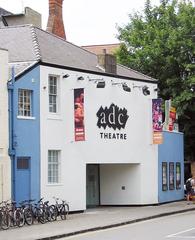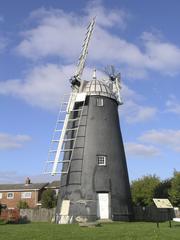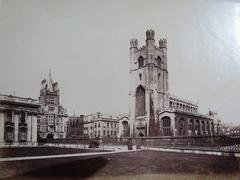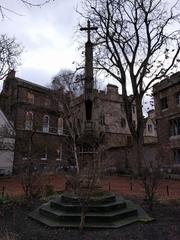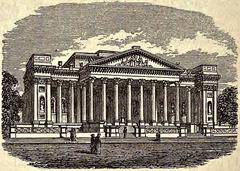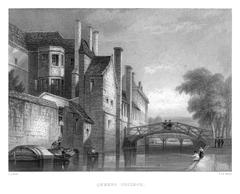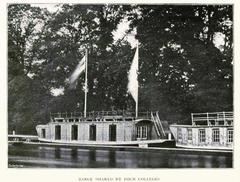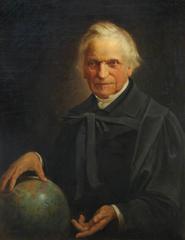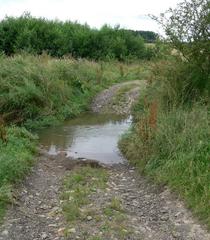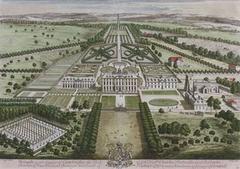
Pembroke College Chapel Cambridge: Visiting Hours, Tickets, and Visitor Guide
Date: 03/07/2025
Introduction
Pembroke College Chapel, nestled in the heart of Cambridge, is a remarkable confluence of architectural innovation, academic tradition, and spiritual reflection. As the University of Cambridge’s first purpose-built college chapel, it stands as an enduring symbol of the city’s collegiate and religious heritage. Designed by Sir Christopher Wren and consecrated in 1665, the chapel is celebrated for its harmonious blend of classical and baroque elements, later enhanced by neo-Gothic additions. Its central role in college life and its proximity to other major Cambridge attractions make it a must-visit site for architecture enthusiasts, historians, and travelers alike.
This detailed guide provides up-to-date information on visiting hours, ticketing, accessibility, and travel tips, ensuring your experience is both seamless and enriching. You’ll also discover the chapel’s cultural, academic, and social significance, as well as recommendations for making the most of your visit.
For further details and official updates, consult the Pembroke College website or established Cambridge heritage resources (Pembroke College Chapel; Britain Express; Exploring Cambridge).
Table of Contents
- Introduction
- History and Architectural Significance
- Visitor Information
- Role in College Life and Traditions
- Cultural, Musical, and Social Impact
- Academic Relevance and Notable Alumni
- Preservation and Modern Engagement
- Frequently Asked Questions (FAQ)
- Plan Your Visit
- References
History and Architectural Significance
Foundation and Early History
Founded in 1347 by Marie de St Pol, Countess of Pembroke, Pembroke College was granted papal permission to build its own chapel—a privilege that set it apart from its contemporaries. The original chapel later became the Old Library, celebrated for its ornate 17th-century plaster ceiling by Henry Doogood.
Sir Christopher Wren’s Design
The current chapel, consecrated in 1665, was the first completed architectural project by Sir Christopher Wren, who would later design St Paul’s Cathedral in London. Commissioned by Bishop Matthew Wren, the chapel introduced classical design principles to Cambridge, marking a significant departure from the prevailing Gothic style (Britain Express).
Later Extensions
In the 19th century, the distinguished architect George Gilbert Scott oversaw the chapel’s neo-Gothic extension, harmonizing the original classical vision with Victorian sensibilities. This blend of styles is visible in the chapel’s façade and interior details (Britain Express).
Notable Features
- Exterior: Red-brick façade with ashlar dressings, pilasters, and a modest pediment.
- Interior: Marble flooring, intricate plaster ceiling, rich woodwork, and impressive stained glass windows.
- Organ: Known for its exceptional acoustics, the organ is central to the chapel’s musical life.
- Historic Artifacts: Includes a scale model by Christopher Wren and commemorative installations such as the “Cross of Migrants,” highlighting social and humanitarian themes (varsity.co.uk).
Visitor Information
Visiting Hours
- General Opening: Monday to Saturday, 10:00 AM – 4:00 PM (subject to change during college events or holidays; verify before visiting).
- Closures: Sundays and during special college occasions.
Tickets and Admission
- Entry: Free for individual visitors; donations for maintenance are welcomed.
- Group Tours: May require advance booking and a modest fee.
- Special Events: Some concerts or lectures may require separate tickets.
Accessibility
- Wheelchair Access: The chapel and surrounding college areas are accessible; contact the Porters’ Lodge ahead of time for specific needs.
- Assistance: Staff are available to provide support for visitors with mobility or sensory impairments.
Guided Tours and Events
- Guided Tours: Offered on select days, focusing on the chapel’s history, architecture, and cultural significance.
- Self-Guided Tours: Audio guides are available at the Porters’ Lodge.
- Events: Regular services, concerts, and lectures are open to the public; check the college’s event calendar for details.
Travel Tips and Nearby Attractions
- Location: Pembroke Street, Cambridge CB2 3RG; centrally located and easily accessible by foot, bike, or local bus.
- Nearby Sights: Fitzwilliam Museum, Cambridge University Botanic Garden, King’s College Chapel, and other historic colleges.
- Photography: Permitted for personal use; be discreet during services and events.
- Best Times to Visit: Early mornings or late afternoons on weekdays offer a quieter experience.
Role in College Life and Traditions
Pembroke College Chapel is central to college life, hosting daily services, concerts, and important ceremonies such as matriculation and graduation. Its cloister features a poignant war memorial, underscoring its ongoing role as a place of remembrance and reflection.
Cultural, Musical, and Social Impact
- Music: The chapel choir and organ feature prominently in services and public concerts, drawing audiences from across Cambridge.
- Artistic Engagement: Installations like the “Cross of Migrants” reflect the chapel’s commitment to contemporary social issues (varsity.co.uk).
- Community Life: The chapel’s chaplaincy supports inclusivity, pastoral care, and cross-cultural dialogue, making it a spiritual and social hub for students and visitors alike.
Academic Relevance and Notable Alumni
The chapel has served as a venue for sermons, lectures, and intellectual discussion for centuries. Notable alumni who have spent formative years in its inspiring environment include William Pitt the Younger, Edmund Spenser, Sir George Gabriel Stokes, Eric Idle, and Tom Hiddleston.
Preservation and Modern Engagement
Pembroke College is dedicated to preserving the chapel’s historical integrity while maintaining its relevance for present and future generations. Ongoing restoration projects, educational outreach, and socially conscious programming ensure the chapel remains a vibrant part of Cambridge’s cultural landscape.
Frequently Asked Questions (FAQ)
What are the Pembroke College Chapel visiting hours?
Monday to Saturday, 10:00 AM to 4:00 PM; closed Sundays and during special events.
Is there an admission fee?
Entry is free; donations are appreciated.
Are guided tours available?
Yes, both guided and self-guided audio tours are available.
Is the chapel wheelchair accessible?
Yes. Contact the Porters’ Lodge in advance for assistance.
How can I get there?
Located centrally on Pembroke Street, the chapel is easily reachable by public transport or on foot from central Cambridge.
Can I take photographs?
Yes, photography is permitted for personal use except during services.
Plan Your Visit
To make the most of your visit:
- Check the official Pembroke College Chapel website for the latest opening times and event schedules.
- Consider combining your visit with nearby attractions such as the Fitzwilliam Museum and the Cambridge University Botanic Garden.
- Download the Audiala app for audio tours and interactive guides.
- Follow Pembroke College on social media for updates on events, concerts, and special exhibitions.
References
Pembroke College Chapel is an extraordinary destination for history lovers, architecture fans, and anyone seeking to experience the spirit of Cambridge. Its rich heritage, welcoming atmosphere, and ongoing commitment to culture and social engagement make it a highlight of any visit to the city.



